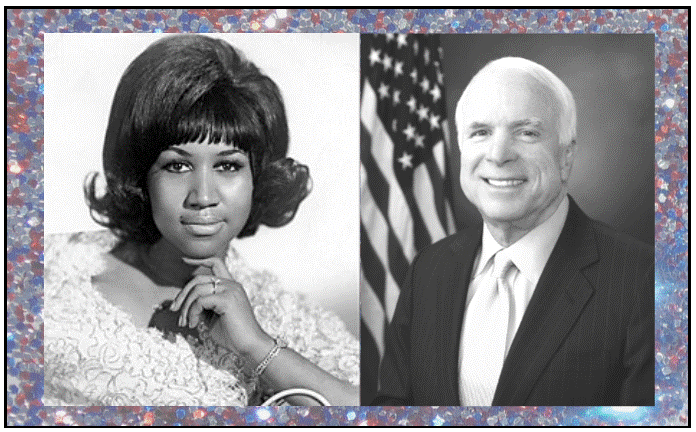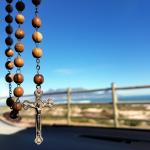A sermon on what Aretha Franklin and John McCain have taught us about what it means to build a legacy of honor, respect, service, and ethical behavior.

Texts: Deuteronomy 4:1-2, 6-9; Psalm 15; James 1:17 – 27; Mark 7:1-8, 14-15, 21-23
Did you notice how our scripture readings today are all about establishing a code of ethics?
Ethics is the study of how we conduct ourselves in the world, how we decide between right and wrong. Our texts today are replete with instructions on right conduct. They hold up a mirror for us to see who we really are. But they also call us to God’s holy hill to see the vision for who we can become – the kind of people, the kind of church, God is calling us to be.
Martin Luther said that God’s law sometimes functions as a mirror, showing us our sin. He got this from the Letter of James we read today:
23 For if any are hearers of the word and not doers, they are like those who look at themselves in a mirror; 24 for they look at themselves and, on going away, immediately forget what they were like. 25 But those who look into the perfect law, the law of liberty, and persevere, being not hearers who forget but doers who act—they will be blessed in their doing. 26 If any think they are religious, and do not bridle their tongues but deceive their hearts, their religion is worthless.
Holding up a mirror to show us our sin. This is exactly what Jesus did when the religious leaders got into a debate with him about what really matters when it comes to God’s laws for us.
14 Then Jesus called the crowd again and said to them, “Listen to me, all of you, and understand: 15 there is nothing outside a person that by going in can defile, but the things that come out are what defile.” 21 For it is from within, from the human heart, that evil intentions come: fornication, theft, murder, 22 adultery, avarice, wickedness, deceit, licentiousness, envy, slander, pride, folly. 23 All these evil things come from within, and they defile a person.” (Mark 7:14 – 15, 21 – 23)
I don’t know about you, but it’s hard not to think about what we’ve heard about in the news in the last couple weeks when you read a passage like this. I can’t help but think about the way those entrusted with leadership in this country have done these very things Jesus listed here.

- Catholic priests in Pennsylvania violating hundreds of children for decades, and the bishops covering up the evil. Fornication, wickedness, deceit, licentiousness, evil. CHECK.
- The president’s campaign manager and personal attorney convicted of and pleading guilty to bank and tax fraud, and campaign finance violations. Avarice, wickedness, deceit, pride, folly. CHECK.
- The president’s own behavior: fornication, adultery, avarice, wickedness, deceit, licentiousness, envy, slander, pride, folly. CHECK. And if you count the migrant children who have died as a result of being in ICE detention centers, and the thousands of Puerto Ricans who died as a result of cutting the island off from needed aid after the hurricane last year – then we might as well add murder to the list as well.
Now understand me – I’m not lifting up these examples in order to bash the Catholic Church, or the president’s men, or the president himself.
The fact is that these things happened, and they are affecting the lives of thousands of people – in fact an entire nation as well as our relationships with other nations around the world. So the question for us as church folk is – who will we be in the midst of this?
Some may say that the church shouldn’t talk about these matters at all.
“I come to worship on Sundays to get a break from the bad news of the world. I don’t want to hear about all this. Tell me the Good News of Jesus Christ!”
But if we’re coming to church to escape, then we’re here for the wrong reasons. And if we think the Good News of Jesus doesn’t have something to say to those victims of the Catholic priests and bishops, and if we think Jesus would be okay with us ignoring these blatant violations of God’s law by the leaders of our nation, then we are mistaken.

Because who was Jesus talking to in this passage? He was speaking directly to the leaders of his day – religious leaders and political leaders. He did not shy away from calling them to accountability, pointing out their hypocrisy, and naming their actions for what they are – sin, in all its varied and grotesque forms.
I know – it’s uncomfortable to talk about these things in church.
I think about our young people here today who might ride home with their grown-ups and ask, “What’s fornication? What’s licentiousness?” Jesus puts us in a difficult position here by using these words, doesn’t he?
Well, so do our leaders when they do these things. We expect our religious and political leaders to hold themselves to the highest possible standards, because we entrust our lives, our livelihoods, and in the case of the priests, our very souls to their care. So when they do these horrendous things, we struggle with what to say to our children who are supposed to be able to look up to these individuals and emulate them. Instead we have to say – see that? That’s what we’re not supposed to do.
Recently I heard a clergy colleague lament that this is a very difficult time to be the church. But you know what?
I think this is the perfect time to be the church.
As much as it alarms me to see what our leaders are doing, they are showing us exactly how not to conduct ourselves in the world. They are holding the mirror up to us and showing us the sin that each one of us is capable of.

This mirror shows us what happens when we do not follow the Ten Commandments. Trust is shattered. Bodies are violated. Emotions are distraught. Families are torn apart. And, ultimately, wrongdoers must answer for their crimes.
But I said earlier that these laws also call us to God’s holy hill to see the vision for who we can become – the kind of people, the kind of church, God is calling us to be.
Psalm 15 gives us very specific instructions for how we are to conduct ourselves in the world:
Who may dwell on God’s holy hill? 2 Those who walk blamelessly, and do what is right, and speak the truth from their heart; 3 who do not slander with their tongue, and do no evil to their friends, nor take up a reproach against their neighbors; 4 in whose eyes the wicked are despised, but who honor those who fear the Lord; who stand by their oath even to their hurt; 5 who do not lend money at interest, and do not take a bribe against the innocent. Those who do these things shall never be moved.
Did you notice that at the same time the headlines blared the sordid stories from the depths of those malicious individuals, we also marked the passing of two people who walked blamelessly, who did what is right, and spoke truth from their heart? They marched and climbed up that steep incline so that they could dwell on God’s holy hill. And they would not be moved.
I’m speaking of the Queen of Soul, Aretha Franklin, and a prince of a man, Senator John McCain.
As I listened to their colleagues, friends, and family recount their memories of these two individuals over the last week and a half, by all accounts, they both honored and feared the Lord. Aretha Franklin and John McCain did not slander with their tongues, and did no evil to their friends. They stood by their oaths, even to their hurt.
John McCain – refused to slander his opponent Barak Obama, even as they disagreed on politics. He stood by his oath to this country, even when it meant spending six years being tortured as a prisoner of war.
Aretha Franklin – whose signature song was RESPECT, she both expected and gave respect to everyone with whom she came in contact. She stood by her oath as a Christian, singing the songs of faith she learned in the church, even as she crossed into soul and pop music. Just as importantly, she dedicated her life to civil rights.
These individuals were not goody two-shoes by any means. They were imperfect human beings who strove to live in a more perfect way. And they stood up against those who were opposed to basic goodness and decency. Verse 4 of the Psalm tells us that those who ascend God’s holy hill are those “in whose eyes the wicked are despised.”
Both Aretha Franklin and John McCain were not afraid to call out wickedness when they saw it.
Aretha used both her voice and her platform as a famed performer to speak out against the evils of racial inequality. McCain confronted both Democrats and Republicans in his own party for not adhering to the fundamental values of the country for which he sacrificed and served.
In Deuteronomy we hear these words from Moses spoken to the people of Israel just before he gives to them the Ten Commandments. He assures them that if they follow God’s commandments, people all over the world will say about them:
“Surely this great nation is a wise and discerning people!” 7 For what other great nation has a god so near to it as the Lord our God is whenever we call to him? 8 And what other great nation has statutes and ordinances as just as this entire law that I am setting before you today? 9 But take care and watch yourselves closely, so as neither to forget the things that your eyes have seen nor to let them slip from your mind all the days of your life; make them known to your children and your children’s children—”
Moses was talking about creating a spiritual, moral, and ethical legacy.

Legacy – that’s the word I kept hearing over and over this past week when people discussed Aretha Franklin and John McCain.
Year after year, decade by decade, they constructed a legacy in their careers and personal lives that would be worthy of standing on God’s holy hill.
That’s why we watched thousands of people come to pay their respects and hundreds give their tributes to these two great individuals when the time came for them to leave this world behind. Their legacy was on full display this week.
And so is the legacy of the individuals I mentioned at the beginning of this sermon. Their legacies are being constructed by their very own decisions, words, and actions right before our very eyes.
Which means that our legacy as Christians and as a church is also being constructed in the midst of all of this.
We have to decide what our legacy will be. Will we sink to the depths we see reflected in that mirror? Or will we ascend that holy hill and become the people God intends for us to be?
The writer John Pavlovitz wrote a blog piece earlier this summer in which he said, “We are, in real-time, crafting our shared legacy, and the world is watching to see who we will be. Our children are too. These are historic days and they will be recorded, and they will tell the story of this country, as either the time good people crossed lines of political party, faith tradition, and racial divide, and course-corrected us out of abject disaster—or the days we all stopped giving a [darn] and fully consented to the darkness. These will be marked as the moments we succumbed to a thousand small assaults on decency – or when we decided to stop the bleeding altogether.”
Friends, we follow a Savior whose spilled blood compels us to stop the bleeding of others.
Jesus’ legacy of ministry, death, and resurrection means that we are freed to live into God’s highest calling for us. Therefore, as James says,
21 Rid yourselves of all sordidness and rank growth of wickedness, and welcome with meekness the implanted word that has the power to save your souls. 22 But be doers of the word, and not merely hearers who deceive themselves.
Yes, the world is watching. Our children are watching. It’s why our kids will be starting Confirmation classes this month. We are teaching them, and they are learning, what it means to be followers of the Ten Commandments, to be followers of Christ. They are, right now, constructing their own legacy. They will be imperfect individuals, to be sure. But we are equipping them with what they need to strive to live in a more perfect way.
John Pavlovitz noted the urgency of this moment for Christians and for our nation. “You and I need to pick a hill worth dying on right now, and we need to ascend it without delay. We need to speak and write and work and protest and vote, and do all the things we’ve been waiting for someone else to do.”
I don’t know about you, but I’m ready to follow Aretha Franklin and John McCain and countless others who have shown us what it looks like to ascend that holy hill.
I’m ready to show my own children and the children in this church how to climb that holy hill. It will be an arduous journey, and there will be times we’re tempted to choose that downhill path instead. But we know who we will find at the top of that hill. The one who beckons to us, saying, “Listen to me, and understand!” The one who is worthy, the one who is blameless, the one who held up the mirror and ascended that hill of Calvary. This one is worthy of our worship and worthy to dwell on God’s holy hill – Jesus Christ, our Savior and Lord. Amen.

Leah D. Schade is a professor of preaching and worship and author of the book Creation-Crisis Preaching: Ecology, Theology, and the Pulpit (Chalice Press, 2015). She is an ordained minister in the Lutheran Church (ELCA).
Twitter: @LeahSchade
Facebook: https://www.facebook.com/LeahDSchade/.
Read also:
Gaslighting in the Age of Trump: 6 Tips for Survival
‘In God We Trump’: Film Review
9 Reasons ‘Trumpy Bear’ is a Sham: The Cuddlefication of a Despot
See also: “Pick a Hill Worth Dying On, America,” John Pavlovitz, July 3, 1018. https://johnpavlovitz.com/2018/07/03/pick-a-hill-worth-dying-on-america/













